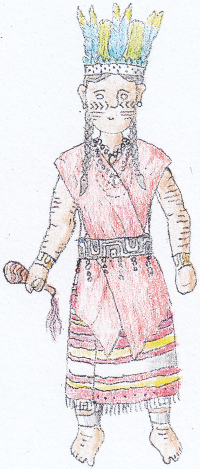Vósali
Afnat: Akn-Vósal
The vósali1 are a collection of tribes inhabiting the southwestern coast of Þonnanó, who share a common tongue and certain customs and beliefs but are divided into rival city-states, not unlike the Pakrans of southwestern Laxilþía back in the day. Currently, their most powerful city is Ú-Ep to the south.
Their civilization is the one of the most prominent in Þonnanó along with the Þonnani further inland, mostly due to extensive maritime trade with the people in the northwest (particularly the Paróbaxi), the Imkalans to the east and, more recently, the Fnóans off the southwestern coast.
However, the most striking aspect of vósali architecture is the use of basalt columns for building the walls, stairs, colonnades and ground floors of major temples, palaces, mansions and altars. The columns are variously painted, gilded or carved to make them even more impressive. This style is most common in Ú-Ep and other cities in southwesternmost Þonnanó, while the vósali to the east often carve pillars and other elements out of other kinds of stone to imitate the basalt columns instead.
The vósali believe that such weapons cannot be reforged if broken, and instead give them a warrior's funeral.
The vósali1 are a collection of tribes inhabiting the southwestern coast of Þonnanó, who share a common tongue and certain customs and beliefs but are divided into rival city-states, not unlike the Pakrans of southwestern Laxilþía back in the day. Currently, their most powerful city is Ú-Ep to the south.
Their civilization is the one of the most prominent in Þonnanó along with the Þonnani further inland, mostly due to extensive maritime trade with the people in the northwest (particularly the Paróbaxi), the Imkalans to the east and, more recently, the Fnóans off the southwestern coast.
Culture
Apparel
Clothing is variously made from cotton, palm-fiber or, for the wealthy, imported cedar-bark cloth or wool. The most common style for men and women alike is a wraparound-loincloth and one or two wide sashes for covering the upper body, all of which is fastened by a belt. Circlets or headband adorned with colourful feathers are popular, as are tattoos, with different designs depending on one's status within society.Art
Architecture
Like many other cultures of Þonnanó and Imkala, granaries and homes of commoners are usually built on stilts, some just tall enough to avoid vermin and floods, while in major cities they can reach enormous heights, with houses located at different levels and connected by a system of platforms, stairs and bridges. The space below is mostly used for pens for pigs, poultry and other animals.However, the most striking aspect of vósali architecture is the use of basalt columns for building the walls, stairs, colonnades and ground floors of major temples, palaces, mansions and altars. The columns are variously painted, gilded or carved to make them even more impressive. This style is most common in Ú-Ep and other cities in southwesternmost Þonnanó, while the vósali to the east often carve pillars and other elements out of other kinds of stone to imitate the basalt columns instead.
Cuisine
Fish and other seafood forms the staple food of the vósali, along with cassava, coconuts, all sorts of fruits and vegetables, honey, pork, poultry, wild game and a variety of spices.Religion
The vósali, like the þonnani, worship a number of spirits, totemic animals and deities both belonging to their local faiths as well as those adopted from the people they trade with. Common themes include the world being created by a pair of deities on top of a hill or mountain -which is why many vósali temples are located on step-pyramids or have tall roofs- and the idea that animals originally lived like humans until they were tricked by the latter and thus doomed to remain as a source of food and clothing for mankind.Funerary practices
Funeral rites vary considerably between different vósali city-states, from being buried in special jars as the Hefmólans do, to cremation, but a belief in reincarnation of some sort is quite widespread, where the spirits of the dead -depending on their actions and status in life- may come back as certain flowers, insects (particularly butterflies) or birds. Tigers are a notable exception as they are guardians of the dead, but the greatest of heroes are often believed to have been tigers in past life, however.Warfare
Vósali warriors are known for their skills with wielding spears, swords and daggers in battle, both on sea and land, though their nobles are especially famed for their weapons with distinct wavy blades, which are treated as living beings that must be cared for in certain ways, lest they might slip out of their owner's hand at a critical moment.The vósali believe that such weapons cannot be reforged if broken, and instead give them a warrior's funeral.
1Original icelandic: Vósalir, singular: Vósali.





Comments